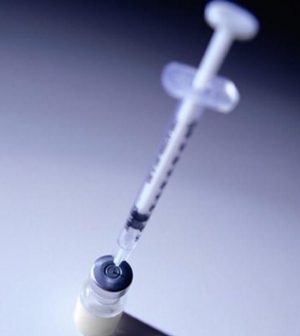- 10 Strategies to Overcome Insomnia
- Could Artificial Sweeteners Be Aging the Brain Faster?
- Techniques for Soothing Your Nervous System
- Does the Water in Your House Smell Funny? Here’s Why
- Can a Daily Dose of Apple Cider Vinegar Actually Aid Weight Loss?
- 6 Health Beverages That Can Actually Spike Your Blood Sugar
- Treatment Options for Social Anxiety Disorder
- Understanding the Connection Between Anxiety and Depression
- How Daily Prunes Can Influence Cholesterol and Inflammation
- When to Take B12 for Better Absorption and Energy
Death From COVID 11 Times More Likely If You’re Unvaccinated: Study

There’s more sobering news for anyone still unvaccinated against the new coronavirus: Your odds of dying from COVID-19 are 11-fold higher than someone who’s fully immunized, new research shows.
The data comes from one of three studies published Friday by the U.S. Centers for Disease Control and Prevention.
“Looking at cases over the past two months when the Delta variant was the predominant variant circulating in this country, those who were unvaccinated were about four and a half times more likely to get COVID-19, over 10 times more likely to be hospitalized, and 11 times more likely to die from the disease,” CDC Director Rochelle Walensky said at a briefing held Friday, CBS News reported.
Although vaccinated people remain largely shielded from severe COVID-19, there are also signs that immunity may wane over time and that booster shots may eventually be needed. The dominance of the highly contagious Delta variant appears to be key, the CDC researchers said.
In one study looking at cases of COVID-19 across 13 U.S. jurisdictions, the chances that a fully vaccinated person might get a breakthrough case rose as the Delta variant strengthened its foothold in a population.
Researchers had expected that, by the end of July, 10% of all COVID-19 cases would be breakthrough cases among the vaccinated. Instead, that number rose to 18%, probably driven by the Delta variant, the CDC team said.
As reported by CBS News, the shift was “consistent with a potential decline in vaccine protection against confirmed SARS-CoV-2 infection,” the researchers said.
While severe disease in the vaccinated remains very rare, there are also signs that vaccine effectiveness against COVID-19 illness severe enough to require hospitalization may be waning in people aged 75 and older, two other studies found.
It’s a new trend: In both studies, researchers noted that waning effectiveness against severe disease in the elderly had not been seen previously, CBS News reported.
All of this may give impetus to federal government plans to begin rolling out booster shots, pending U.S. Food and Drug Administration approval and the sanction of a CDC advisory panel.
Pfizer has its vaccine booster shot up for FDA approval first, CBS News said, and the agency’s panel of experts is expected to review Pfizer’s data next week. Moderna and Johnson & Johnson are also slated to submit data on their respective booster shots over the coming weeks.
Will boosters give recipients a needed uptick in immunity? Data from abroad appears to support the idea.
Israel has already started administering booster shots to its population, and “although earlier studies showed that hospitalization protection, most recent studies, in my personal communication with Israeli health authorities, indicate that there’s even now a significant diminution [in cases],” said Dr. Anthony Fauci, director of the U.S. National Institute of Allergy and Infectious Diseases. He spoke at a virtual event hosted by the London School of Hygiene and Tropical Medicine on Wednesday, CBS News reported.
In addition, research conducted by Yale University in New Haven, Conn., not yet peer-reviewed, found that the early booster shot rollout in Israel appeared to reduce the odds of infection by up to 68%.
The new CDC studies were published in the agency’s Morbidity and Mortality Weekly Report.
More information
Find out more about COVID-19 vaccines at the CDC.
SOURCE: CBS News
Source: HealthDay
Copyright © 2026 HealthDay. All rights reserved.










